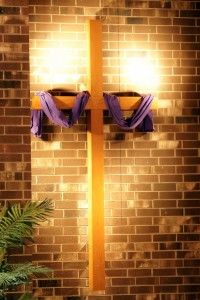
For Christians, the week leading up to Easter Sunday is one of passion, reverence, sorrow, and expectation. It’s the time to focus on sin and death and darkness while waiting on the hope of resurrection.
But if you’ve been stuck in the dark so long you’ve started to feel hopeless, Holy Week feels a bit hollow.
I used to participate in my church’s Holy Week services, which included Good Friday services. The sanctuary was dimly lit, the choir wore black, a cross loomed on the stage, the music was forboding, and other than those assigned to speak or sing, everyone was asked to remain in silence. It gave a new meaning to Black Friday.
I tried to focus on my unworthiness and Jesus’ death. I didn’t have to work too hard to summon guilt and shame; I’ve known them since childhood. But no matter how much I wanted to feel the holiness and reverence of the service, I usually left feeling like I’d been part of a production. I would wonder why I didn’t feel like I was supposed to feel, which would increase my overwhelming sense of guilt and shame. Nothing about me or the service felt holy or sacred.
Ironically, the times I felt the presence of Holy and Sacred were in moments of artistic creation, conversation over dinner and drinks, listening to “secular” songs, or watching the sun set over the bay. I didn’t find Jesus in a church service; rather, I found him where the Church least expected him to be.
I suppose if there’s a Biblical character I identify with most, it would be Peter, the one who denied knowing Jesus. It’s not that Peter didn’t know Jesus or love him, it was that he couldn’t be—was afraid to be—who the religious people wanted him to be. To admit knowing the Jesus of grace and mercy and forgiveness was to admit to heresy. To admit being a friend of this Jesus who was so different than what the religious people expected was to willingly face punishment.
When Jesus told Peter that he (Peter) would be sifted like wheat, maybe the sifting was less about Peter denying him and more about the guilt and shame that became his undoing. Maybe it was about the hopelessness he felt of returning to his old life. Maybe it was about the despair of doubt, of feeling like Jesus had been a sham.
Perhaps Peter felt the hollowness of Holy Week, too.
The past couple of years, I’ve spent the week leading up to Easter secretly hoping for a miracle. I’ve begged for grace in my own Garden of Gethsemane. I’ve looked for resurrection among the ruins. I’ve longed to hear my name spoken amidst the graves where my life has stalled in grief. I’ve expected triumph to replace tragedy.
Instead, I still stand staring at a door that won’t open, at guards who refuse to give way, at a death I never wanted or expected. I know what it is to taste the goodness of the Holy and Sacred. I know how it feels to be questioned about my relationship with Jesus and grace by the religious elite. I know what it feels like to wonder if it was all a sham and to run back to the hopelessness of life as you knew it before.


